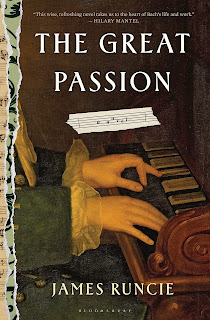I received this book for free from Netgalley. That did not influence this review.
The Great Passion by James Runcie is a newly released historical novel that swept me away.
Sometimes a superb book opens slowly. I have to give it several pages, a chapter, two chapters, before I am caught up. Others have a voice that captures me from the opening words. The Great Passion was one of the latter. The novel drew me in immediately, even though its voice was that of an eighteenth-century man about to indulge in memories of his pre-adolescent self.
The majority of the book is told from the viewpoint of young Stefan Silbermann, a boy whose voice has not yet changed, who sings a beautiful soprano. He is the son of an organ maker from a long line of prestigious organ makers. His mother recently died and his father decides to send him to a music school for boys that is attached to a church, St. Thomas in Leipzig, to further his musical education. This is in preparation for the day when he will take over the family business. Also, sending him away is supposed to help him put aside his grief for his mother.
Stefan spends one year at the school, but experiences so much growth over that year that it seems a small lifetime. The Cantor at the school is Johann Sebastian Bach.
Bach is not named in the novel. He’s referred to as the Cantor. It’s a superb way of placing us back in time to before he was BACH. Not that his talent was not recognized, but his name did not yet have centuries of weight behind it. Keeping him semi-anonymous puts us on a more contemporary footing.
The year of this novel (1727?) is the year that Bach was composing The St. Matthew Passion. And while the storyline culminates in the performance of the Passion, and while the adult Stefan recognizes that this was a pivotal moment in his life and in the history of music, the book is not simply the story of Bach struggling with the composition and ultimately triumphing. The young Stefan experiences the creation of this masterpiece in the context of his own difficult transition from child toward adult. The Passion is both central and peripheral.
With its exquisite prose, the novel is a meditation on death, life, music, religion, and everything in between. Runcie writes with such confidence in his material that there are no false notes. I could hear the language of these deeply religious eighteenth century men and women and feel that I was there, not looking back at them from the distance through a novel. I am non-musical and deeply ignorant about the mechanics of music, and yet I never stumbled over the passages where music was woven into the story. Seamlessly. Detailed without being cumbersome.
There is bullying and kindness, violence and gentleness. Bach is both a temperamental, hard taskmaster and a generous mentor and loving family man. Stefan is a boy on the cusp of manhood and a middle-aged man looking back on a defining year of his life.
This book was not a “page-turner,” but it was hard to put down. I can’t recommend it highly enough.














This sounds really good. Adding it to my TBR list now!
ReplyDelete